-

新人教版高中英语必修3Unit 4 Space Exploration-Listening&Speaking&Talking教学设计二
The themes of this part are “Talk about how to become an astronaut” and “Talk about life in space”. As Neil Armstrong said “Mystery creates wonder and wonder is the basis of man’s desire to understand. Space is difficult for human to reach, therefore, humans are full of wonders about it. However, if wanting to achieve the dream of reaching the Moon, some of our human should work hard to be an astronaut at first. Part A(Talk about how to become an astronaut) is a radio interview in a radio studio, where the host asked the Chinese astronauts about his story how to become an astronaut. Yang Liwei told his dreamed to be an astronaut since childhood. Then he worked hard to get into college at 22. The next 10 years, he gradually became an experienced pilot. At the same time, to be an astronaut, he had to study hard English, science and astronomy and trained hard to keep in good physical and mental health and to practise using space equipment. Part B (Talk about life in space) is also an interview with the astronaut Brown, who is back on the earth. The host Max asked about his space life, such as his emotion about going back the earth, the eating, shower, brushing, hobbies and his work. Part A and Part B are interviews. So expressing curiosity about the guests’ past life is a communicative skill, which students should be guided to learn.1. Students can get detailed information about how Yang Liwei became an astronaut and Max’s space life.2. Students learn to proper listening strategy to get detailed information---listening for numbers and taking notes.3. Students can learn related sentences or phrases to express their curiosity like “ I wish to know...” “I’d love to know...”4. Students can learn more about the space and astronauts, even be interested in working hard to be an astronaut

新人教版高中英语必修3Unit 5 The value of money-Reading and Thinking教学设计二
? Could you offer me some kind of work here?? I don’t want your charity, I just want an honest job.? Careless: I landed in Britain by accident.Step 7:Consolidation.? Find Henry? Roderick and Oliver were I .making a bet when they saw Henry, a poor young man. ? Know Henry? About a month ago, Henry was sailing and later he found himself carried out to sea by a strong wind. Fortunately, he 2.was spotted by a ship. And it was the ship that brought him to 3.England? Offer money to Henry ? Oliver and Roderick gave Henry a letter and told him that there was money in it. They 4.persuaded him to accept it, and made him 5.promise that it wouldn't be opened until 2 o'clock.Step 8:Language pointsa large amount of: a large quantity of; a great deal ofe.g. They bought a large amount of furniture before they moved their new house.make a bet: make an arrangement to risk money, etc. on an event of which the result is doubtful.e.g. We made a bet on the result of the match.permit sb to do something: allow somebody to do somethinge.g. My mother doesn’t permit me to ride in the street after it rained.by accident: as a result of chancee.g. I only found it by accident.stare at: look at somebody or something with the eyes wide open in a fixed gaze( in astonishment, wonder, fear, etc)to be honest: to tell you the truth; to be franke.g. To be honest, I don’t think we have a chance of winning.Step7 Homework:What do you think will happen to Henry? Will the bank-note help him or get him into trouble?

新人教版高中英语必修3Unit 1 Festivals and Celebrations-Listening &Speaking&Talking教学设计
The theme of this section is “Talk about festival activities and festival experiences”.Festival and holiday is a relaxing and interesting topic for students. This part talks about the topic from the daily life of students’. In the part A ---Listening and Speaking, there are three conversations among different speakers from three countries(Japan, Rio and China), where the speakers are participating in or going to participate in the festivals and celebrations. So listening for the relationship among them is a fundamental task. Actually, with the globalization and more international communication, it is normal for Chinese or foreigners to witness different festivals and celebrations in or out of China. In the Conversation 1, a foreign reporter is interviewing a Japanese young girl who just had participated in the ceremony of the Coming-of-Age Day on the street and asking her feeling about the ceremony and the afterwards activities. Conversation 2, Chinese girl Li Mei is witnessing the Rio Carnival for the first time, and her friend Carla gives her some advice on the costumes which enables her to match with the carnival to have a good time. Conversation 3, a Chinese guide is showing a group of foreign visitors around the Lantern Festival and introducing the customs of the festival to them. The three conversations have a strong vitality and insert the festival and cultural elements from different countries. So perceiving the festivals and cultures from different countries is the second task. At the same time, the scripts also insert the targeted grammar --- v-ing as attributive and predicative, which students can perceive and experience in a real context and make a road for the further study. That is the third task. In the Part B--- Listening and Talking, the theme is “Talk about festival experience”, which is the common topic in our daily conversations. During the conversation, Song Lin, a Chinese student, asked Canadian friend Max about how to spend Christmas. In the conversation, Song Lin talked about experience and the feelings during the Chinese Spring Festival, during which there are not only some enjoyable things but some unpleasant things. After the listening, perhaps students find there are some similarities between Christmas and the Chinese Spring Festival as there are some differences in the origins and celebrations. For example, people always visit friends and relatives, decorate their houses, have a big dinner together, chat and give presents to each other.

新人教版高中英语必修3Unit 1 Festivals and Celebrations-Reading for writing教学设计二
Step 3 Analyzing article structureActivity 31. Teachers raise questions to guide students to analyze the chapter structure of this diary and think about how to describe the festival experience. (1)What should be included in the opening/body/closing paragraph(s)?(2)How did the writer arrange his/her ideas?(3)What kind of interesting details did the writer describe?(4)How did the writer describe his/her feelings/emotions during the event?2. Students read and compare the three sentence patterns in activity 2. Try to rewrite the first paragraph of the diary with these three sentence patterns. After that, students exchange corrections with their partners. Such as:●This was my first time spending three days experiencing the Naadam Festival in China’s Inner Mongolia Autonomous Region and it was an enjoyable and exciting experience. ●I'll never forget my experience at the Naadam Festival because it was my first time to watch the exciting Mongolian games of horse racing, wrestling, and archery so closely. ●I'll always remember my first experience at the Naadam Festival in China’s Inner Mongolia Autonomous Region because it was so amazing to spend three days witnessing a grand Mongolian ceremony. Step 4 Accumulation of statementsActivity 41. Ask the students to read the diary again. Look for sentences that express feelings and emotions, especially those with the -ing form and the past participle. Such as:● …horse racing, wrestling, and archery, which are all so exciting to watch. ● some amazing performances● I was surprised to see…● I was a little worried about. . . ● feeling really tiredOther emotional statements:●I absolutely enjoyed the archery, too, but the horse races were my favourite part. ●I'm finally back home now, feeling really tired, but celebrating Naadam with my friend was totally worth it. ●He invited me back for the winter to stay in a traditional Mongolian tent and cat hot pot. I can’t wait!2. In addition to the use of the -ing form and the past participle, the teacher should guide the students in the appreciation of these statements, ask them to memorize them, and encourage them to use them reasonably in writing practice.

新人教版高中英语必修3Unit 3 Diverse Cultures-Reading and Thinking教学设计
Discuss these questions in groups.Q1: Have you ever been to a place that has a diverse culture ? What do you think about the culture diversity ?One culturally diverse place that I have been to is Harbin, the capital city of Heilongjiang Province. I went there last year with my family to see the Ice and Snow Festival, and I was amazed at how the culture as different to most other Chinese cities. There is a big Russian influence there, with beautiful Russian architecture and lots of interesting restaurants. I learnt that Harbin is called “the Oriental Moscow” and that many Russians settled there to help build the railway over 100 years ago.Q2: What are the benefits and challenges of cultural diversity ?The benefits: People are able to experience a wide variety of cultures, making their lives more interesting, and it can deepen the feelings for our national culture, it is also helpful for us to learn about other outstanding culture, which helps improve the ability to respect others. The challenges: People may have trouble communicating or understanding each other, and it may lead to disappearance of some civilizations and even make some people think “The western moon is rounder than his own.”Step 7 Post reading---RetellComplete the passage according to the text.Today, I arrived back in San Francisco, and it feels good (1) _____(be) back in the city again. The city succeeded in (2)_________ (rebuild) itself after the earthquake that (3)________ (occur) in 1906, and I stayed in the Mission District, enjoying some delicious noodles mixed with cultures. In the afternoon, I headed to a local museum (4)____ showed the historical changes in California. During the gold rush, many Chinese arrived, and some opened up shops and restaurants in Chinatown to earn a (5)_____ (live). Many others worked on (6)______ (farm), joined the gold rush, or went to build the railway that connected California to the east. The museum showed us (7)____ America was built by immigrants from (8)________ (difference) countries and cultures. In the evening, I went to Chinatown, and ate in a Cantonese restaurant that served food on (9)________(beauty) china plates. Tomorrow evening, I’m going to (10)__ jazz bar in the Richmond District. 答案:1. to be 2. rebuilding 3. occurred 4. that 5.living6. farms 7.how 8. different 9. beautiful 10. a

新人教版高中英语必修3Unit 5 The Value of Money-Listening &Speaking教学设计
Step 4: Listen again and decide if the following statements are true (T) or false (F).1 It was the first time Chen Liyan's story was reported. T口 F口2 Chen found 10,000 yuan in a small plastic bag in Taiyuan railway station口 F口3 Wang Zheng apologized to Chen because he couldn't offer her more money. T口 F口4 Chen took out a large loan to cure her daughter, T口 F口5 Wang set up a fundraising website for Chen's daughter after Chen told him about her situation. T口 F口Step 5:After listening, discuss the questions.1 What kind of person do you think Chen Liyan is?Chen Liyan is generous and honest because she returned a large sum of money to the owner.2 Did Chen return the money because she didn't need it?No. She returned the money because it was the right thing to do. Evidence for this is that she refused to accept the reward money because she felt that it had not been earned. 3 Is it common for people to do what Chen did?It depends on the culture. In some countries it is quite common to return money that has been found. In other countries, people believe "Finders are keepers!" 4 How did Wang Zheng feel about the return of his money?He must have been very happy and relieved to have gotten his money back. We know this because he thanked Chen repeatedly and even offered her a reward.5 Why did Ma Dongbao tell Wang about Chen's family?He must have had great sympathy for Chen and her daughter and wanted to help them.'We know this because he arranged help for them. 6 How did the news reporter feel about Chen's actions?The news reporter felt that it showed that money wasn't the most important thing in life. We know this because the reporter told us that this is what Chen believes. and then said, “that's a great attitude to take."

新人教版高中英语必修3Unit 5 The Value of Money-Reading for Writing教学设计二
2. 您能看到, 我头发太长了。You can see that my hair is much too long.3. 无论什么时候, 只要您想回来就回来。Please come back whenever you want.4. 您仅有很少的头发要理! You only have too little hair to cut !5. 为您服务是我的荣幸!It is my honour to serve you!Step 9 Writing(Henry is walking down the street when he sees a sign for a place that cuts hair. He decides to have it cut. )H=Henry B=BarberH: Good afternoon, I’d like to have my hair cut, if I may. (The barber looks at Henry’s hair and continues cutting another man’s hair. ) Er, I’d really like a haircut. As you can see it’s much too long. B: (in a rude manner) Yes, I can see that. Indeed, I can. H: Fine, well, I’ll have a seat then. (He sits in one of the barber’s chairs. The barber turns to look at Henry. )B: It’s quite expensive here, you know! Are you sure you can afford it?H: Yes. I think so. (After his hair is cut, the barber tells Henry how much he must pay. Henry shows the barber the bank note. )B: Why Mr. . . (looks shocked)H: Adams. Henry Adams. I’m sorry. I don’t have any change. B: Please don’t worry! (wearing a big smile) Nothing to worry about! Nothing at all! Please come back whenever you want, even if you only have too little hair to cut! It will be my honour to serve you!Step 10 Pair workExchange drafts with a partner. Use this checklist to help your partner revise his/her draft.1. Are all the elements of a play included and in good order ?2. Do the character use suitable language ?3. Are the stage directions clear and useful ?4. Is the plot clear and exciting enough ?
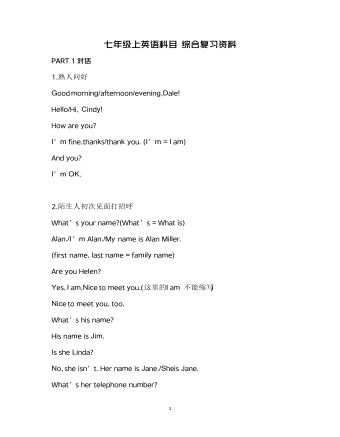
部编版英语七年级上总复习知识点教案
2.陌生人初次见面打招呼What’s your name?(What’s = What is)Alan./I’m Alan./My name is AlanMiller.(first name,last name = family name)Are you Helen?Yes, I am.Niceto meet you.(这里的Iam 不能缩写)Nice to meetyou, too.What’s his name?His name isJim.Is she Linda?
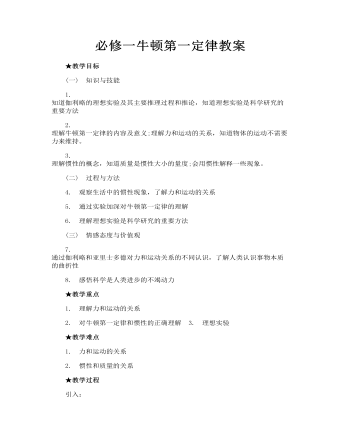
必修一牛顿第一定律教案
(二)?过程与方法? 4.?观察生活中的惯性现象,了解力和运动的关系? 5.?通过实验加深对牛顿第一定律的理解? 6.?理解理想实验是科学研究的重要方法? (三)?情感态度与价值观? 7.?通过伽利略和亚里士多德对力和运动关系的不同认识,了解人类认识事物本质的曲折性? 8.?感悟科学是人类进步的不竭动力
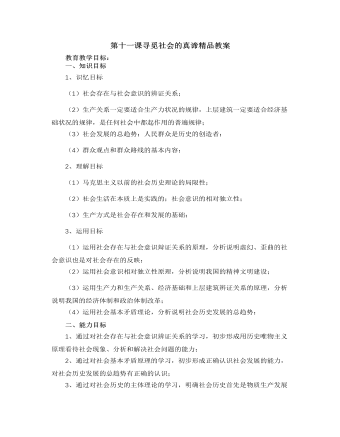
人教版高中政治必修4第十一课寻觅社会的真谛精品教案
A生产方式是人类社会存在和发展的基础人要生存必须有吃、穿、住、用等物质生活资料,只有生存问题解决了才能谈得上社会的存在和发展,才能从事其他的活动(教育、艺术、体育、政治)。而要获得物质生活资料,必须从事物质资料的生产劳动。在这一活动中,形成了现实的生产力和生产关系,即生产方式。【思想教育】落后必然挨打,我国大力发展经济,就是为了发展生产力。发展是硬道理,中国解决一切问题的关键在与自己的发展。要积极支持改革开放,积极投身于经济建设中去。现在学好知识将来教育育人,为社会培养更多的合格人才。B生产方式决定着社会的性质和面貌社会生活纷繁复杂,包括经济生活、政治生活、精神生活、婚姻家庭生活等许多方面。这些方面都受生产方式的制约,有什么样的生产方式,就有什么样的社会结构;不同的生产方式,表现为不同性质的社会形态。社会的整个面貌只能从生产方式中得到科学的说明。【举例】家庭联产承包责任制的产生与推广1958年的人民公社化运用曾使中国农民在劳动和分配上都实行绝对的平均主义,大锅饭的结果是饭越吃越少,人越过越穷。
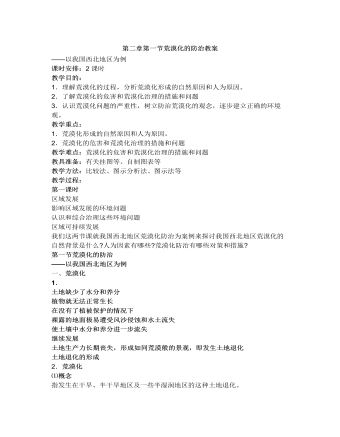
人教版高中地理必修3第二章第一节荒漠化的防治教案
1.根据下面的图文资料,说明前苏联垦荒区土壤风蚀的潜在自然背景。并说明人们的生产活动怎样加剧了这个过程。点拨:对图2.16的分析,要知道”垦荒地区”处于亚欧大 陆的中部偏北的地方,虽处于西风带但远离水汽来源,故降水稀少。从其周边的内陆湖“里海”、“咸海”的分布特点,可以推断,这是一个半荒漠向干草原的过渡地带,是一个生态环境比较脆弱的地区,其自然地理状况必定是寒冷、干旱、大风。2.20世纪60年代中期以来,前苏联在总结大规模垦荒经验教训的基础上,采取了一系列综合防护措施。仔细分析这些措施,你认为该地区防治荒漠化(土壤风蚀)的主要方向是什么?点拨:要善于将所列四项保护措施逐条进行分析,而后进行归纳,不难找出它们之间的共同的东西,那就是“抗旱、防风、保水、保土、保肥”。3.根据所学知识,你认为前苏联垦荒区防治荒漠化的对策与措施可以被我国的哪些地区所借鉴。
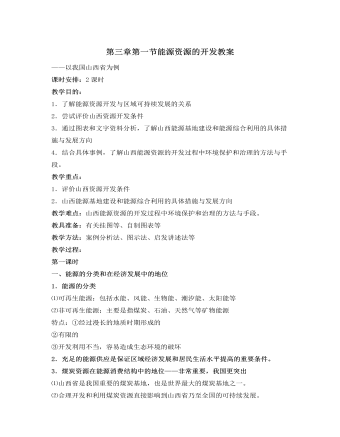
人教版高中地理必修3第三章第一节能源资源的开发教案
山西省总结出了许多重点工矿区的生态环境建设模式,即围绕煤田的露天开采区、居民点和主要交通线建设区,通过工程及生物措施,结合土地的复垦,充分利用厂矿的人力、财力和科技优势,建立集约经营的高效蔬菜、水果及肉蛋奶生产基地(图3.13)。1.说一说图中各种工程及生物措施的作用。点拨:参考图3.13图中各工程及措施的作用:(1)隔离护坝:主要作用是将采掘区与河流隔开,以免河水流入采掘区。(2)排水沟:主要作用是引开可能进入采掘区的雨水或其他水源。(3)公路紧靠采掘区,方便运输车辆就近从工地上公路。(4)“固沙草方格”,即在流沙表面用麦草、稻草扎成1×1米的草方格,使流沙不易被风 吹起,达到阻沙、固沙的目的,并在草方格上栽种沙蒿、花棒、籽蒿、拧条等沙生植物,建立起旱生植物带,营造挡沙树林。
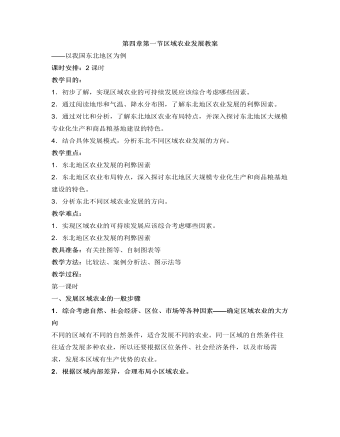
人教版高中地理必修3第四章第一节区域农业发展教案
1.根据下面的材料,归纳珠江三角洲发展基塘生产有利的地理条件。珠江三角洲地势低平,河网密布,降水充沛。北回归线从珠江三角洲的北部穿过。桑树和甘蔗主要分布于热带和亚热带。广州是古代海上丝绸之路的起始地之一。水产品在广东人的食物结构中占有较大的比重。点拨珠江三角洲地区发展基塘农业生产有利条件可以结合材料,归纳为三个方面:地形、气候、市场(当地和海外)具体分析略。2.图4.16所示的基塘生产将哪些产业联系起来?哪些副产品(或废弃物)被充分利用起来?这种联系对农村经济发展有什么作用?点拨基塘生产环节将种植业(桑、蔗等)、养殖业(养蚕、养鱼)、工业(丝厂、糖厂)等几种产业紧密的联系在一起。在此环节中,塘泥、蚕沙(蚕屎)、蚕蛹、缫丝、滤泥、蔗叶等副产品被充分的回收利用。养蚕业、蔗糖加工业同塘鱼养殖业紧密结合,作为一种综合的经营,几者之间相互依存、相互促进、扬长补短,有机地循环联系起来。
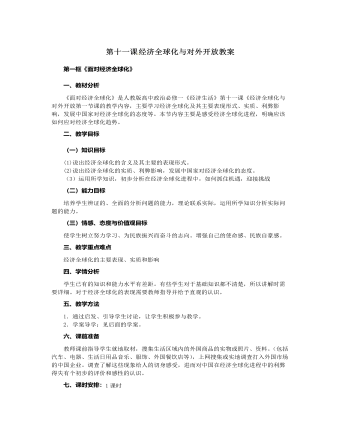
人教版高中政治必修1第十一课 经济全球化与对外开放教案
材料说明了什么?探究二:材料分析:2005年12月13日至18日,WTO第六次部长级会议在香港召开。会议经过谈判通过了《部长宣言》,规定发达成员和部分发展中成员2008年前向最不发达国家所有产品提供免关税、免配额的市场准入;发达成员2006年取消棉花的出口补贴, 2013年年底前取消所有形式农产品出口补贴。材料体现了世界贸易组织在国际经济贸易领域中发挥哪些作用?探究三:P97:A、这些图示,反映出我国利用外资哪些特点?。B、能为我国提高外资利用水平提出些建议吗?探究四:材料展示:我国是人口众多的发展中大国,全国居民每天消费总额达到37亿元。每天消费粮食75万吨,相当于一个县级商品粮基地的全年产量;每天消耗猪肉6万吨,食油1万吨,糖1.6万吨,鲜蛋1.8万吨。每天购买杂志600多万册,报纸5000多万份,需要400量中型载货汽车才能装载。
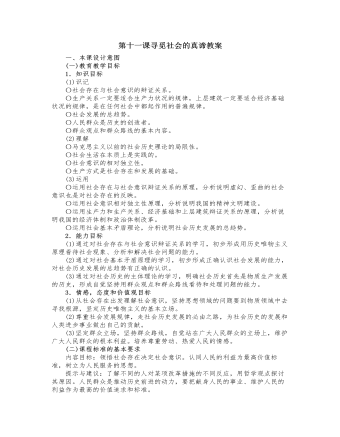
人教版高中政治必修4第十一课寻觅社会的真谛教案
思考提示在阶级社会中,社会基本矛盾的解决主要是通过阶级斗争实现的,阶级斗争是推动阶级社会发展的直接动力,当旧的生产关系严重阻碍生产力发展,需要进行变革时,代表旧的生产关系的没落阶级却不会自动退出历史舞台,利用旧的上层建筑维护自己的统治,只有代表新生产力发展方向的阶级通过社会革命,推翻没落的阶级统治,才能解放生产力,推动社会向前发展。所以,阶级社会的进步往往是通过激烈的社会革命实现的。但是,社会主义社会与阶级社会不同,这是因为,社会主义社会中,生产力和生产关系、经济基础和上层建筑之间的矛盾是一种非对抗性矛盾,不需要通过一个阶级推翻另一个阶级的阶级斗争的方式来解决,只能通过改革实现社会的发展,通过对生产关系和上层建筑进行改革,实现社会主义的自我完善,从而促进社会的发展。所以,我国经济体制改革是在坚持社会主义制度的前提下,改革生产关系和上层建筑中不适应生产力发展的一系列相互联系的环节和方面。
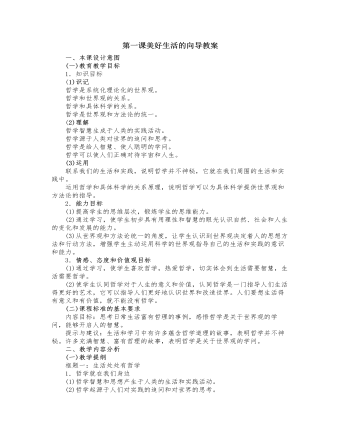
人教版高中政治必修4第一课美好生活的向导教案
3.柏拉图(公元前427一前347)古希腊哲学家。生于雅典。苏格拉底的弟子,亚里士多德的老师。他曾在雅典创办学园,收徒讲学,逐步建立起欧洲哲学史上第一个客观唯心主义体系。他也是欧洲哲学史上第一个有大量著作传世的哲学家。他提出世界的本源是“理念”,现实中的事物都是“理念”的摹本。人的知识来源于对“理念”的回忆。柏拉图的哲学思想对后世影响很大,有人说,柏拉图之后的欧洲哲学思想都是对柏拉图思想的注脚。4.黑格尔(1770—1t53l)19世纪德国古典哲学家,客观唯心主义者、辩证法大师。生于斯图加特,卒于柏林。出身于官僚家庭。曾在图宾根神学院学习哲学和神学。大学毕业后,做过几年家庭教师。后任报纸编辑、中学校长、大学讲师、教授和柏林大学校长。黑格尔是在法国革命的直接影响下成长起来的,青年时朝气蓬勃,非常激进。他还深受著名诗人歌德的影响。1818年,他到柏林大学任教后,公开美化普鲁士专制制度,号召人们同现实妥协。
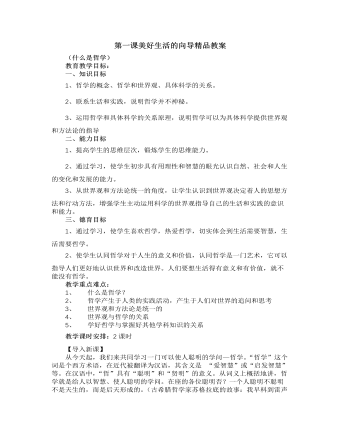
人教版高中政治必修4第一课美好生活的向导精品教案
b哲学为具体科学提供世界观和方法论的指导每一个时代的具体科学的发展,总是受到这个时代哲学思想的影响和支配。任何一个科学家都有自己的哲学信仰,都用一定的哲学世界观来指导自己的研究。缺乏正确的世界观和方法论的指导,就会在研究中失去正确方向,甚至陷入混乱和失败。【举例】牛顿晚年误入歧途牛顿早年在自发的唯物主义世界观的指导下,发现了万有引力定律,谱写了人类物理史上的辉煌篇章。他谦虚地说,他是站在巨人们的肩膀上,拾取了知识大海里一个晶莹美丽的贝壳。但在他的后半生,居然虔诚地投入上帝地怀抱,用25年的时间研究神学,写了100多万字有关神学和宗教的书稿。牛顿是一个虔诚的宗教信徒,自幼受到信奉上帝的教育,这对他的世界观影响极深,加之他所处的时代是形而上学统治自然科学的时代,在错误的世界观的支配下,他将解释不了的现象求助于上帝,如“从上帝那里去寻找行星围绕太阳公转的第一推动力”,结果一事无成。
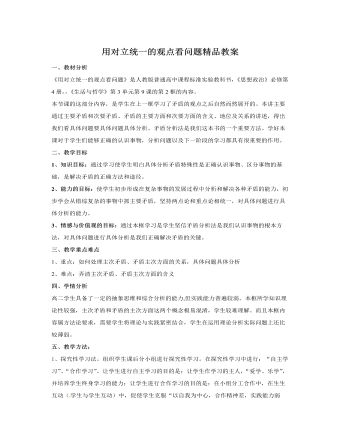
人教版高中政治必修4用对立统一的观点看问题精品教案
1、重点:如何处理主次矛盾、矛盾主次方面的关系,具体问题具体分析2、难点:弄清主次矛盾、矛盾主次方面的含义四、学情分析高二学生具备了一定的抽象思维和综合分析的能力,但实践能力普遍较弱。本框所学知识理论性较强,主次矛盾和矛盾的主次方面这两个概念极易混淆,学生较难理解。而且本框内容属方法论要求,需要学生将理论与实践紧密结合,学生在运用理论分析实际问题上还比较薄弱。五、教学方法:1、探究性学习法。组织学生课后分小组进行探究性学习。在探究性学习中进行:“自主学习”、“合作学习”。让学生进行自主学习的目的是:让学生作学习的主人,“爱学、乐学”,并培养学生终身学习的能力;让学生进行合作学习的目的是:在小组分工合作中,在生生互动( 学生与学生互动)中,促使学生克服“以自我为中心,合作精神差,实践能力弱“等不足,培养综合素质。2、理论联系实际法。关注生活,理论联系实际,学以致用。
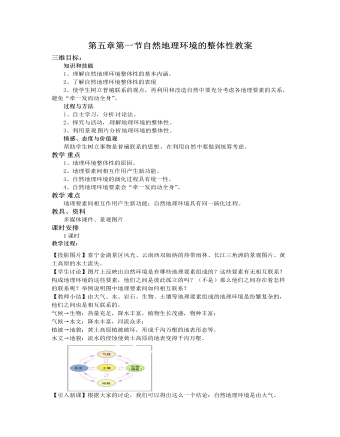
人教版高中地理必修1第五章第一节自然地理环境的整体性教案
知识和技能 1、理解自然地理环境整体性的基本内涵。2、了解自然地理环境整体性的表现3、使学生树立普遍联系的观点,再利用和改造自然中要充分考虑各地理要素的关系,避免“牵一发而动全身”。过程与方法 1、自主学习,分析 讨论法。2、探究与活动, 理解地理环境的整体性。3、利用景观 图片分析地理环境的整体性。情感、态度与价值观帮助学生树立事物是普遍联系的思想 ,在利用自然中要做到统筹考虑。教学 重点1、地理环境整体性的原因。2、地理要素间相互作用产生新功能。3、自然地理环境的演化过程具有统一性。4、自然地理环境要素会“牵一发而动全身”。教学 难点地理要素间相互作用产生新功能;自然地理环境具有同一演化过 程。教具、资料多媒体课件、景观图片课时安排
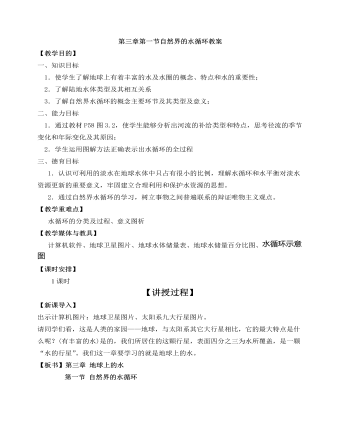
人教版高中地理必修1第三章第一节自然界的水循环教案
浅层地下水是贮存于地表松散堆积物中的潜水。主要受降水、气温、蒸发等气象因素影响,有明显的季节变化与日变化,并与河水有相应补给关系,即河水高于潜水面时,河水补给地下水,反之地下水补给河流;深层地下水是长时间内渗入地下深入储存起来的,它缓慢地流出补给河流,受气象因素影响很小,通常只有年变化,季节变化已不明显。当然,一条河流的河水补给来源往往不是单一的,而是以某一种形式为主的混合补给形式,对流域自然条件复杂的大的河流来说尤其如此。我国长江上游地区除雨水、地下水外,高原高山上冰川、积雪在夏季融化也补给河流;东北地区的河流,由春季融化积雪补给,夏季则由雨水和地下水补给;西北内陆盆地除雨水外,夏季高山冰川、积雪融化成为河流的主要补给形式。我国季风地区,大部分河流以雨水补给为主,而冬季则由地下水补给。